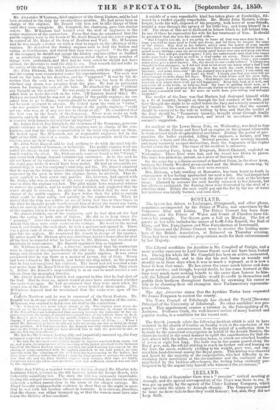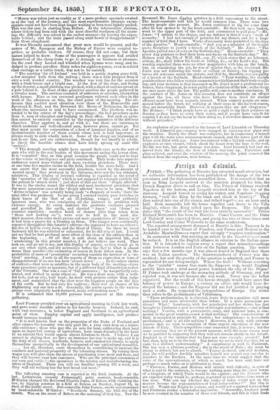IRELAND.
On the 14th of September there was a " monster" revival meeting at Armagh, and the special correspondent of the Times was there to see. It was got up partly by the agency of the Ulster Railway Company, which agree to carry the saints to Armagh cheaply. The Company promised to issue no more tickets than they could honour ; but, alas, they did not keep faith.
"Money was taken just as readily as if a mere profane spectacle awaited us at the end of the journey, and the most reprehensible pleasure excur- sionists could not have been kept longer waiting or been more tightly packed. This was the case in starting from Belfast. At the intermediate stations, where tickets h&j been sold with the most cheerful readiness all the morn- ing, the difficulty was solved in the coolest manner—by leaving the expec- tants behind ; and the train passed along amid howls of disappointment" from those abandoned.
It was liberally announced that great men would be present, and the names of Mr. Spurgeon and the Bishop of Exeter were coupled to- gether, as probable visitors. Of course, they did not come, but their names helped to draw. Some of the passengers it appears had availed themselves of the cheap tramn to go to Armagh on business or pleasure. On the road they hooted and whistled when hymns were sung, and in- dulged in profane parodies. Sixty miles for eighteen pence, even in a third class carriage or a cattle truck, was not to be resisted.
" The meeting for all Ireland' was held in a gently sloping grass field, a few minutes' walk from the railway ; there was a wide prospect from it over a well wooded country. The weather was very fine for the occasion with a fresh breeze and a bright sun. At the foot of the slope, and facing up the descent, a small platform was pitched, with a sheet of canvass spread on a pole behind it. In front of this primitive erection the people gathered in a circular mass. The services consisted of addresses or sermons, alternating with hymns. Nine or ten reverend gentlemen relieved each other in the work of the afternoon on this, the chief point of the meeting. The ad- dresses that excited most attention were those of the Honourable and Reverend B. Noel, and the Reverend Mr. Moore of Ballymena, the place where the movement is said to have commenced. The platform was in- tended to be the centre of the day's proceedings ; the best preachers spoke from it, men of education and training in their office. But such an agita- tion cannot be entirely controlled by the regular ministers of the different churches. They approve it, and go with it; but there are extremes to which moderate and well-educated men, however pious, cannot go. Yet they must accept the cooperation of a host of ignorant fanatics, and of no inconsiderable number of those zealots whose zeal is half imposture, or always -ready to slide wholly into it. Some of the clergy are beginning at last to see this, and are endeavouring, though far too timidly as a body, to check the horrible abuses that have lately sprung up amid this 'revival.'
" The Armagh meeting might have opened their eyes as to the sort of men who will be the real leaders of this movement among the lowest class. It is regretted' that on this great occasion the people could not be kept at the centre of intelligence and piety combined. They broke into separate audiences round more violent and more exciting preachers. There were at one time five smaller circles in the field, besides the main body. And I can assert that the most successful preachers, tested by the amount of mental agony' they produced in the listeners, were not the ten ordained, ministers. This display of internal suffering is regarded as the proof of the operation of the spirit,' which is not supposed to triumph entirely till the patient is 'struck down' ; just short of this are those deeply affected.' It was in the circles round the wildest and most incoherent preachers that the most numerous cases of the' deeply affected' were to be seen. Where divine religion' was actually being made a rhapsody of words,' there the mbst effect was produced. In one group I counted twenty poor wretches on their knees at the 'feet of an ill-looking, vulgar, and evidently ignorant man, who was consigning all the universe to perdition with extreme energy. At every sentence the prostrate creatures groaned and grovelled in the earth, and shouted ' Amen' and 'Jesus' in constant repetition : another batch of sinners (this time taken from
those now looking on' ), were sent to hell in the most dis- tinct manner, then came more groans and more ejaculations of Amen,' as if it had been a prayer for a blessing on them. Two images were continually repeated throughout this fanatic's address—he appeared to have no others— the fire of hell in every form, and the blood of Christ. On these he raved furiously till he was satisfied exhausted, for he did stop at last. I could not see that he had produced more effect at the close of his address than at the beginning.. . . Of all that is said about an improved life, and ' awakening,' in this greater number, I do not believe one word. They look on, and go out to see, just this display of misery, as they would go to see any other sight, and are accessories before the fact to what is almost worse than murder—the extinction of reason in their fellow man. In the probability of oases of prostration' occurring consists the interest of a re- vival' meeting. I note in all the reports of them an expression or tone of disappointment if no one has been 'struck down.' . . . In the minor circles of auditors—that were as satellites in the main body of the meeting—there were preachers quite as ignorant, but of a different kind of fanaticism to that of the Terrorist. One was a case of full assurance • ' he was perfectly con- tented, and wished to make others so. He was a short man, with a well- fed look, and an oily, bald head ; he dealt with promise rather than judg- ment, and maintained that the elect were the happiest people on the face of the earth. But he had very few auditors ; there was no chance of his frightening any one into a fit. Generally, the active agents in the various groups were singularly hard-featured, many evil-looking men." It is estimated that 10,000 persons were present at this strange gathering.
Lord Fermoy presided over an agricultural meeting in Cork last week, and gave some sensible advice to his bucolic hearers. Ireland; he said, with vast resources, is below England and Scotland in an agricultural point of view. Employ capital and apply intelligence, and produce would increase tenfold.
" It is well known that on the properties of the Duke of Portland and other estates the tenantry who only paid 10s. a year rent drag on a miser- able existence ; those who pay 508, an acre for land, cultivating their land upon an improved system of agriculture, have sums deposited in the bank to an amount that would appear almost fabulous to them. I believe I am correct in stating that we have an immense lee-way to make up, and it is the duty, of all classes, landlords, farmers, and commercial classes, to apply themselves energetically to the development of our agricultural resources. . . . Let all, therefore, exert themselves in contributing to increase the comforts and material prosperity of the labouring classes. By raising their wages you will give them the means of purchasing your meat and flour, and they will become your best customers. Who are the principal consumers of our corn and cattle ?—the operatives in the milling and manufacturing dis- tricts of England. There you will see families earning 101. a week, and they will eat nothing but the best bread and meat."
The following amusing case is reported in the Irish journals. At the last Letterbreen (county Fermanagh petty sessions, head-constable M'Kinley charged the Reverend Charles Jones, of Belcoo, with violating the law, by digging potatoes in a field at Belcoo, on Sunday, August 142 in view of the public street. Sub-constable John Carson, sworn and examined by head-constable lif`Kinley " .Recollects Sunday, the 14th day of the month. Waa on the street of Belcoo on the morning of that day. gaw the Reverend Mr. Jones digging potatoes in a field convenient to the street. The head-constable told digging him potatoes
would summon him. There were two country people also present. Mr. Jones continued to dig foe some time after he was spoken to by the bead-constable. He then took up a basket, went to the upper part of the field, and commenced to pull peas."—Mr. Jones : "I submit to the charge, and my defence is that it was a ' work of necessity.' I had not enough of potatoes for my dinner, and for a large number of fowl that I have. Works of necessity were permitted in the days of the Apostles." Head-constable : "And you as a minister of the Gospel quote Scripture to justify a breach of the Sabbath." Mr. Jones : "The Apostles pulled ears of corn on the Sabbath-day." Head-constable : "They never dug potatoes to feed their hens and ducks on the Sabbath-day." Mr. Holmes read the 7th of Will. III., cap. 17, which states that no labourer, artisan, &e., shall follow his trade or calling, &c., on the Lord's day. His worship regretted there were no other magistrates with him on the bench, but, on considering the act, he was of opinion that, as the Reverend Mr. Jones was not following his trade or calling on Sunday, his digging po- tatoes did not come under the statute, and that he therefore, was not guilty
of a breach of the Sabbath. Head-constable : "'d worship, the statute punishes those who follow certain amusements which:arenot their tmde or call- ing, and your decision is that inasmuch as Mr. Jones is not a professional la- bourer, but a clergyman, he is not guilty of a violation of the law ; so the clergy are once more above the law. The public will come to another conclusion. If the conduct of Mr. Jones on this occasion does not constitute an offence against the law, all those who have hitherto been fined for similar offences must have been unjustly treated. When country people are sum- moned before the bench for working at their crops in the harvest season, they are invariably fined. However, it appears they are not clergymen.' Mr. Holmes : "I think people have us good a right to dig their potatoes on Sunday as they have to carry their water, and if people have oats fit for reaping I do not see the harm in their doing so, I therefore dismiss this case without prejudice."
An explosion of gas occurred in the house of Lord Limerick on Thursday week. A Limerick gas company were engaged in currying new pipes over the mansion. Nearly the whole was complete, but in connecting a branch pipe with the main sonic mismanagement ensued, and the lower part of the houSe soon filled with gas. Some one entered with a lighted candle, and an explosion at once ensued, which shook the house from the base to the roof. No life was lost, but great damage was done. Lord Limerick had just re- moved from the library, the floor of which was torn up. Furniture and glass suffered, and even the windows of the nursery, the point removed the farthest from the explosion, were broken.



























 Previous page
Previous page